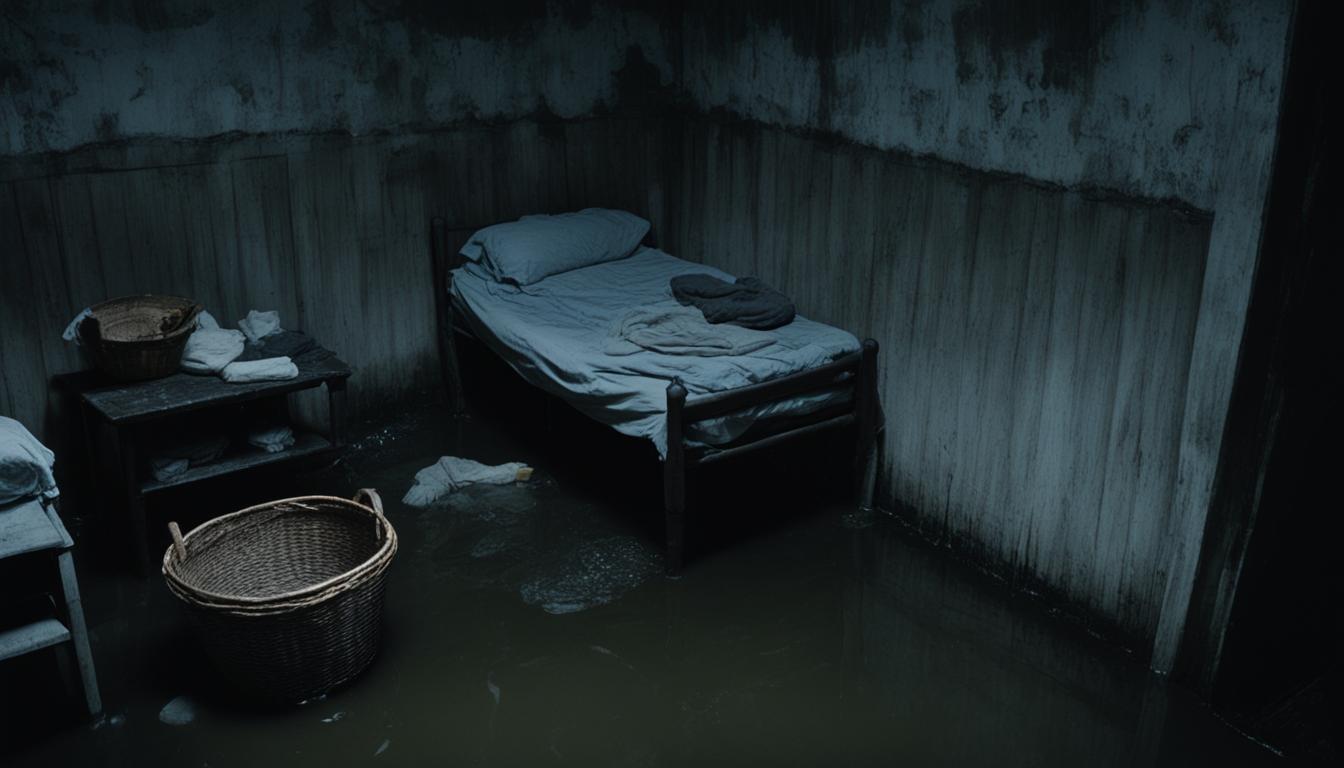If your home has flooded or experienced water damage, you may be wondering if it is safe to sleep in your house. It’s a valid concern, as water damage can pose various risks to your health and home safety.
Before you decide to sleep in a house with water damage, it’s crucial to assess the severity of the damage and take necessary precautions to protect yourself and your family. In this article, we will discuss the potential hazards of water damage and measures you can take to ensure your safety.
Key Takeaways:
- Water damage can pose various risks to your health and safety.
- Assess the extent of the damage before considering sleeping in a water-damaged home.
- Take necessary precautions to minimize health risks, such as cleaning and disinfecting affected areas.
- Temporary solutions, such as using dehumidifiers and sealing leaks, can help create a safer environment.
- It’s important to seek professional restoration services to ensure a thorough and safe restoration process.
Assessing the Extent of Water Damage
When it comes to water damage, assessing the extent of the damage is crucial. This will allow you to determine the best course of action to take and help prevent any further damage from occurring. Look out for common signs of water damage, including dampness, stains, and mold. If you notice any of these signs, it is important to evaluate the extent of the damage before considering sleeping in the house.
Evaluating the damage includes determining the affected areas, the severity of the damage, and the cause of the water damage. Is the damage limited to a small area or has it spread throughout the entire house? Was the water damage caused by a leaky roof or burst pipe? Identifying the source of the water damage is crucial to ensuring that it is properly addressed.
One effective way to assess the extent of water damage is by using a moisture meter. This tool can help determine the level of moisture in different areas of your home, which can provide insight into the severity of the water damage.
Remember, addressing water damage is crucial for your own safety and well-being, as well as preventing further damage to your home. Take the time to evaluate the extent of the damage before attempting any repairs.
Health Risks Associated with Water Damage
Water damage can pose serious health risks to you and your family. Mold is a common problem in water-damaged homes and can cause respiratory issues such as coughing, wheezing, and asthma attacks. Mold exposure can also trigger allergies and exacerbate existing health conditions.
Bacteria can also grow in water-damaged areas and can cause infections and other health problems. In addition, contaminated water from floods or sewage backup can contain harmful pathogens that can cause serious illnesses.
To avoid these health hazards, it is crucial to take precautions when dealing with water damage. Wear protective gear such as gloves, masks, and goggles when cleaning and disinfecting affected areas. Keep the damaged areas well-ventilated to prevent mold and bacteria growth. If you suspect that there may be contaminated water, do not attempt to clean it yourself and seek professional help immediately.
To ensure your safety and the safety of your family, it is recommended that you consult with a professional restoration company for proper evaluation and treatment of water damage in your home.
Precautions for Sleeping in a Water-Damaged Home
If you choose to sleep in a house with water damage, it is crucial to take various precautions to ensure your safety and protect your health. Here is a list of recommendations to create a safer sleeping environment:
| Safety Measures | Why It’s Important |
|---|---|
| Proper Ventilation | Prevents mold and bacteria growth by removing damp air and replacing it with fresh air. |
| Use Protective Gear | Wear gloves, a mask, and goggles to protect yourself from harmful substances such as mold spores, bacteria, and chemicals in cleaning products. |
| Clean and Disinfect Affected Areas | Eliminates any potential health hazards, such as mold growth, bacteria, or contaminated water. |
| Seek Medical Attention | If you experience any symptoms of respiratory issues, allergies, or infections, seek medical attention promptly. |
| Avoid Sleeping in Affected Areas | Even with precautions, it is still best to avoid sleeping in areas with severe water damage, as it may pose a threat to your health and wellbeing. |
To maintain a safe and healthy living environment, it is crucial to continue taking these precautions until the water damage is properly repaired. If the damage is major or extensive, we recommend seeking the services of a professional restoration company.
Temporary Solutions for Water Damage
Living in a water-damaged house can be hazardous to your health. While it’s important to seek professional assistance, there are steps you can take to create a safer living environment. Here are some temporary solutions to help mitigate water damage:
| Temporary Solution | Description |
|---|---|
| Dehumidifiers | Reduce moisture levels, promote ventilation, and prevent microbial growth. |
| Sealing Leaks | Stop water from entering your home by sealing leaks with waterproof materials. |
| Temporary Barriers | Prevent water from entering your living area by using sandbags, plastic sheets, or other temporary barriers. |
| Water Extraction | Remove water from your home using a wet/dry vacuum or mop and bucket. Use caution if the water is contaminated with sewage or other harmful substances. |
Keep in mind that these solutions are temporary and may not be effective for long-term water damage repairs. It’s important to consult with a professional restoration service to assess the extent of the damage and determine the best course of action.
Seeking Professional Restoration Services
While there are several measures you can take to mitigate water damage in your home, seeking professional restoration services is essential to ensure your safety and well-being. Professional restoration companies possess the expertise, training, and equipment necessary to address the damage and prevent further harm to your property and health.
Professional restoration services offer several benefits, including:
- Thorough assessment: Restoration experts can conduct a comprehensive evaluation of the damage, identifying the source of the water intrusion and the extent of the damage that may not be apparent to an untrained eye.
- Effective mitigation: Professionals have access to specialized equipment that can quickly dry the affected areas, reducing the risk of mold growth and other hazards.
- Prevention of future damage: Experts can provide recommendations for preventing future water damage and taking corrective measures to address underlying issues in your property’s structure or plumbing.
However, it is essential to hire reputable restoration companies with a proven track record in providing professional restoration services. Take time to research and compare different companies, review their credentials and certifications, and seek references from past clients.
Remember, your safety and well-being should always be a top priority in any water damage restoration effort. By hiring experts to address the damage, you can ensure a thorough and safe restoration process, helping you return to normalcy faster and with minimal stress.
Conclusion
When it comes to water damage safety, it’s crucial to prioritize your well-being. Sleeping in a house with water damage can pose health risks, so it’s essential to assess the extent of the damage, take necessary precautions, and seek professional help when needed. Remember to prioritize proper ventilation, wear protective gear, and thoroughly clean and disinfect affected areas to minimize health hazards.
Temporary solutions, such as using dehumidifiers and sealing leaks, can help mitigate the damage and create a safer living environment. However, seeking professional restoration services is the best way to ensure a thorough and safe restoration process. Choose reputable restoration companies, and trust the experts to assess the damage and handle the restoration process.
Overall, it’s necessary to take the necessary steps to maintain a secure living environment in a water-damaged house. Don’t compromise your health and safety. Prioritize water damage safety, and take immediate action to protect yourself and your loved ones.
FAQ
Can you sleep in a house with water damage?
It is not recommended to sleep in a house with water damage. Water damage can pose various safety and health risks, including the potential for structural instability, mold growth, and contamination of water sources.
How do you assess the extent of water damage?
To assess the extent of water damage, you can look for signs such as dampness, stains, musty odors, and visible mold growth. It is crucial to thoroughly inspect all affected areas, including walls, floors, ceilings, and furniture.
What are the health risks associated with water damage?
Water damage can lead to health hazards such as mold growth, exposure to bacteria, and contaminated water. These hazards can cause respiratory issues, allergies, skin irritation, and other adverse health effects.
What precautions should you take when sleeping in a water-damaged home?
If you choose to sleep in a water-damaged home, it is important to take precautions to protect your health. Ensure proper ventilation, use personal protective equipment like masks and gloves, clean and disinfect affected areas, and consider using air purifiers or dehumidifiers to reduce moisture and mold growth.
What are some temporary solutions for water damage?
Temporary solutions for water damage include using dehumidifiers to reduce moisture levels, sealing leaks to prevent further water intrusion, and setting up temporary barriers to protect unaffected areas. However, it is essential to seek professional restoration services for a long-term solution.
Why is it important to seek professional restoration services for water damage?
Professional restoration services are crucial for proper water damage mitigation and restoration. Experts have the knowledge and equipment to assess the extent of the damage, safely remove water and moisture, prevent mold growth, and restore your home to a safe and healthy condition.
Conclusion
To ensure your safety and well-being, it is best to avoid sleeping in a house with water damage. If you do choose to stay temporarily, take necessary precautions to minimize health risks. However, seeking professional restoration services is highly recommended to address the root cause of the damage and restore your home properly.









